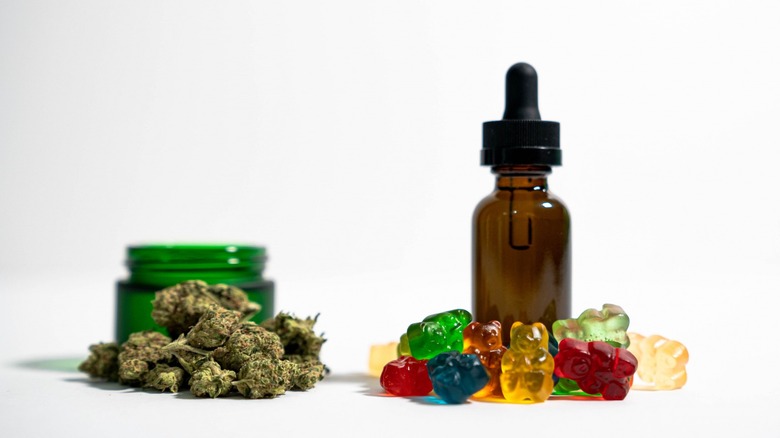Why The FDA Is Looking To Work On New Regulatory Guidelines For CBD Use
Hemp has come a long way in the American marketplace since it was banned from production in the 1930s (per Forbes). In 2018, Congress legalized hemp, which paved the way for cannabidiol, or CBD, to enter the marketplace. By some estimates, the CBD market has ballooned to some $6 billion dollars as many people have gained access to a bevy of CBD products, like infused drinks, candies, tinctures, and topicals, reports The New York Times. But why has the CBD market become so popular and profitable?
CBD is one of the chemical compounds, called cannabinoids, in the cannabis plant, according to Healthline. Unlike tetrahydrocannabinol (THC), CBD does not give the user feelings of euphoria. However, CBD has many purported benefits, including relief from addiction, anxiety, arthritis, post-traumatic stress disorder (PTSD), and schizophrenia, and it even may serve as an anti-inflammatory. In fact, CBD is also marketed as a general wellness booster. In short, it is being touted as a miracle remedy. Unfortunately, while only one CBD drug known as Epidolex is approved by the United States Food and Drug Administration for the treatment of a rare form of seizures in children, there are a number of products on the CBD market that are unregulated, which is giving the FDA cause for concern. Here's why the agency plans to get new regulatory guidelines in place.
FDA calls out dangers and unknowns of CBD
Cannabidiol (CBD) may actually be a cause for concern with regard to use in children and pregnant women, in addition to potential interactions with medication and damage to the liver and male reproductive system, according to a statement by the United States Food & Drug Administration (FDA). Further, the FDA has concluded that there is not sufficient evidence to determine how much CBD is safe to consume and for what period of time. In turn, the agency has called on Congress to work together on a plan to regulate CBD products since the current regulatory pathways are insufficient for protecting the health and safety of people.
However, a report from The New York Times reveals that some members of Congress have been waiting for the FDA to take action on the regulation of the CBD market for some time, and even sent a letter last year that cited the agency's shortfalls in working together for proposed legislation to tackle the CBD market. This game of ping pong between Congress and the FDA has elicited mixed opinions, with some representatives serving up hope about the FDA's announcement, and others returning the blame to the FDA for its stalled efforts.

